Why do we take pictures?
By Arend-Jan Westerhuis – See the website HERE
It’s a vexed question for sure, especially in the psychological sense. But I’m not going to do the full research here.
In the article, which my brother wrote a while back, he introduced us as wedding photographers. And in that proession we have seen a lot of other people take pictures. Some of them really go out on a limb to get their content and by doing so they are sometimes interfering with us or the proceedings of the day. My brothers and I tend not to mind these other photographers as much as some of our colleagues do. Sometimes we call their bluff by jumping in front of them, after they did it to us. Which on occasion is the start of a cold war of ‘who gets the closest.’
So why do they do it? Taking that pictures I mean. For instance; what is driving that uncle to bring his fancy DSLR and that monstrosity of a flashgun to the wedding? Whatever it is he may be doing, he isn’t going to create something beautiful, or document any precious moment in a subtle manner. He is at most having the idea of adding value to the day whilst maybe entertaining the concept of honing a skill. Another archetype we seem to encounter is the girlfriend-of-the-bride unholstering her iphone during her jump in front of us forcing me to recompose the shot . I like to think it is part of their coping process; to stretch out the emotions of the moment by being able to summon them again at will until they are without substance. Possibly hoping to care more on a later moment.
I did not intend for this article to be a vent, although it certainly seems to start off that way. On the one hand I can congratulate them with their enthusiasm for photography. But on the other I just keep wondering; Why do they even invest the effort? Why don’t they just enjoy that moment where your friends are in the spotlight. I am there as a photographer which is a role I hope to fullfill to their satisfaction. So what is the urge to take pictures without being asked to? Who are they taking those pictures for? And in realising that question I ask myself: Why does anyone take pictures without being paid to do so? I hope that by reflecting on ourselves and others everyone reading this article may find out for themselves what their drive to take pictures is.
Since the dawn of the digital camera it seems everybody deems themselves an artist. Or at least the access to means to be taking pictures has skyrocketed. I see a lot of people with entry-level DSLR’s paired with power zooms who are trying to be creative. On a wedding day they might be thinking they see some things which I might not. Which will probably turn out to be true. The urge to be creative is good in and of itself! I’d say that it is import to try to develop some new skills every once in a while. Possibly a sport or dancing or whatever. But in this case I’d say you pay to high a price. You miss more than you gain. As it seems that at all important life events are witnessed through the lens of a camera. Maybe it would be better to practise on something else?
In the past there has been a discussion about whether photography could even be art. Some said that is because in essence the camera copies. It doesn’t create because it transcribes. And its product is a resemblance of something that was. Some people reading will probably feel the strong urge to oppose these statements and while I do not wish to deny photography its artistic possibilities I do think a good study of what these people are stating actually helps to think about what makes photography unique to other media. For instance I think that in this copying power lies the true greatness of photography. It enables the photographer to point out something small or big that really happened. Which makes it different from for instance painting where everything is an interpretation. The camera is a witness to things; the things we point it at. Which may be a tear, an emotion, a murder or a kiss. It can be a play of lines, repetition. A photo can be suggestive or revealing. It is the skill of a photographer to see, expect, put together by framing and capture those things. And everyone notices different things!
But is that power of photography still a cherished quality today? Everyone has a camera, so when every picture you see is of something extraordinary, no picture is anymore. Sure, if images of special moments become common it create the urge for something extra. It seems people turn away from wanting to capture extraordinary and move towards the forcing emotions in viewing and the estrangement of the visible world. Some would call it art or a move towards art, but I’m worried photography is blurring with painting, where the first emotion of a photo is no longer: ‘wow, that really happened!’
Not all is lost yet though. But where we now stand and depending on what group of photographers you are tuned into it seems everything is about filters, lenses and photoshop. VSCO and instagram are solutions available for the amateurs and upwards. The ability to create atmosphere where there was none. Nostalgia has been turned into a forced emotion which can applied to pictures taken just minutes ago. Even Lightroom in the right(wrong) hands can turn a rainy day into a Spanish sunset. On the other end is the use of ultra-high speed lenses which are the solution for the connoisseur. Isolation power seems to be the new standard for those with exquisite taste in glass. The recipe only involves the following ingredients: a subject, a background and high-speed glass. The first step is to place your object anywhere but in the middle, leaving the rest of your frame to be turned into sweet swirly bokeh! Even some good photographers resort to this type of image making once they acquire those expensive high speed lenses. But consider this: if a pictures wouldn’t be a good one at F5.6, it’s also crap at F0.95. Most of us (me too, I admit) drool over the bokeh because everything hard to obtain is something to lust after. It does not, or in any case I think it should not, make the picture substantially better.
One famous photographer at old age was pointed to the fact that his hands were not as steady anymore. He replied that “sharpness is a bourgeois concept”. I’d say that depth of field has joined sharpness as something to brag with. Sometimes F0.95 might be needed to create sufficient isolation to force attention towards a subject, but most of the time there are other option available as well. In these pictures the isolation is abundant and therefore redundant. This still entails however that I have a timeline on Flickr and Facebook full of pictures which seems to be stuff found on casual Sunday strolls like leaves, flowers and other nonsense. In these types of pictures it’s clearly used to show off lenses, bokeh, filters and such. More important than the actual flower is the size of the bokehballs behind. If you cannot invest the time to find some interesting subjects, maybe you couldn’t afford the gear after all?
One of the better reasons for taking pictures which I frequently hear is that photographs serve well as memories. It is the department me and my brothers are in. ‘The business of memory making’ or maybe just giving people the means that help savour their special moments. And yes, if my house was burning down I too would try to save my hard-drive for the pictures. Pictures as documents of history can be very valuable. But if you yourself and the family are the targeted audience, isn’t it better to make memories before trying to savour them? And by only recognising social highlights as picture worthy, aren’t we cutting short on life itself? The mundane and the average? If the ‘extraordinary’ of what you are taking pictures of is usually a social highlight within your group of friends you might want to consider leaving your camera home more often.
But what is picture worthy then? Is it up to you? Or maybe up to the viewer? Some people have good eyes for landscapes or architecture and others more for people. Some recognise moments that should be shared, which is the journalistic approach and sometimes, it is the beauty of something or someone. For me personally a good photo is a well-timed and well executed picture of something that occurred. The type of occurrence that make that you cannot go back and redo the image, because whatever it was is gone by then. As long as I have that moment, a lack of sharpness or bokeh is not necessarily problematic, because the moment and what is happening is the central piece. In photography, I would argue, you should put your own needs aside. A photographer should not be bragging through his pictures with his gear, his friends, money or anything else. In editing it should not be about forcing an atmosphere where there was none, let alone faking or manipulating authenticity. I like to think that photography is about letting others see whatever it is you have seen and want them to see. Something real and something that you think might be of value to them. This forces you to become an entertainer and therefore the other has become the audience. Everybody sees a lot of stuff every day and chooses to ignore most of it. So seeing a picture is the author telling you it shows something worth watching. There is a great vulnerability in showing the things you think are special. And in that sense photography is a very serving and humble profession.
So maybe think about it; why are you taking pictures? What message are you conveying through your images?
Kind regards,
Arend-Jan Westerhuis

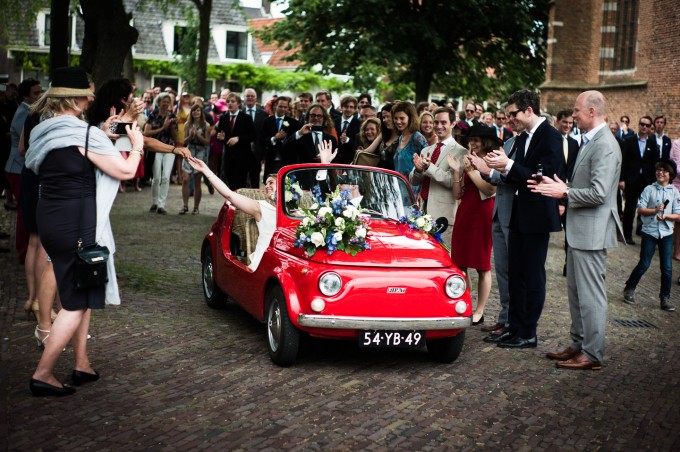
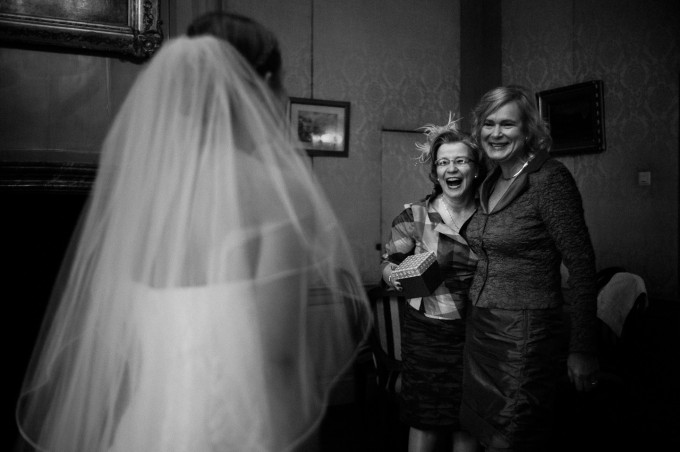
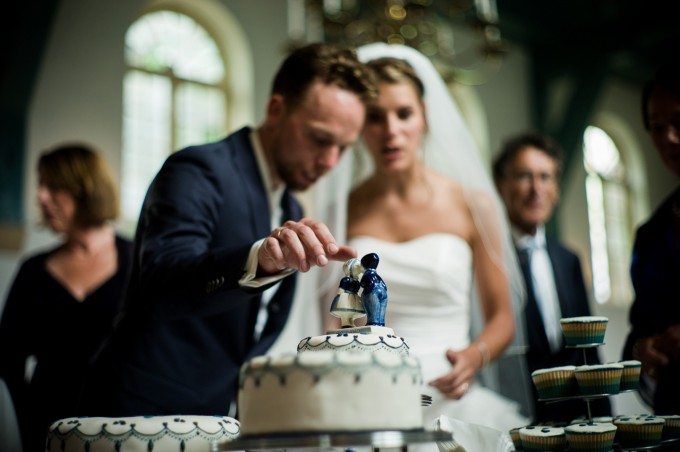
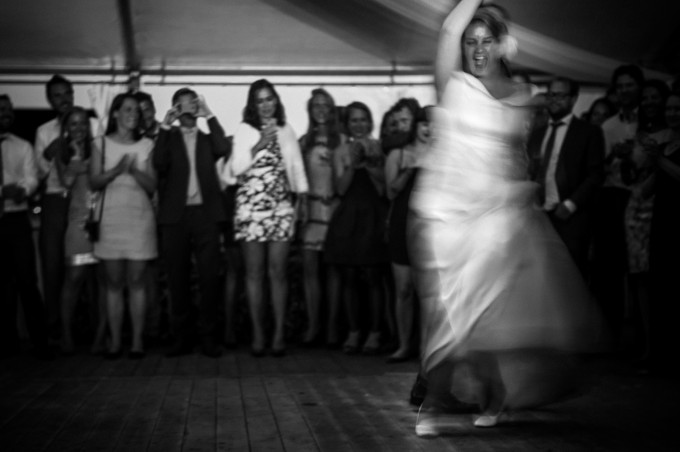
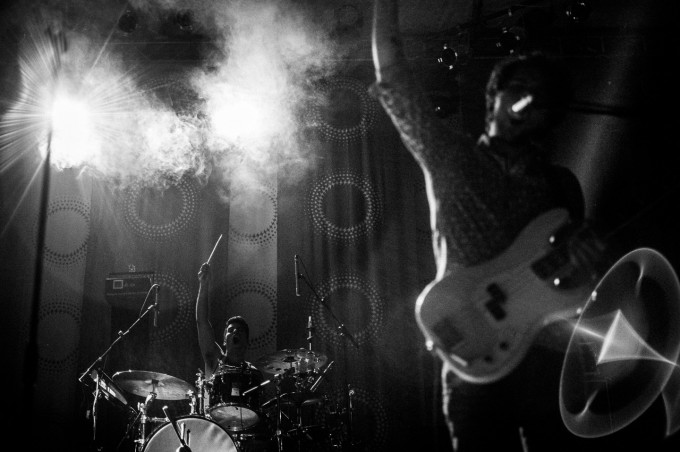



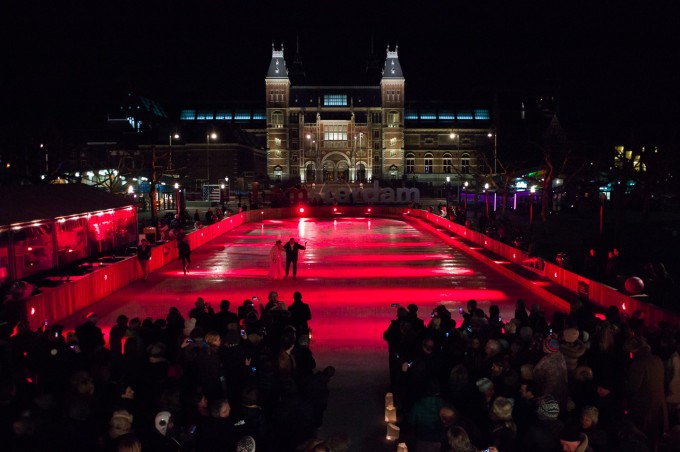
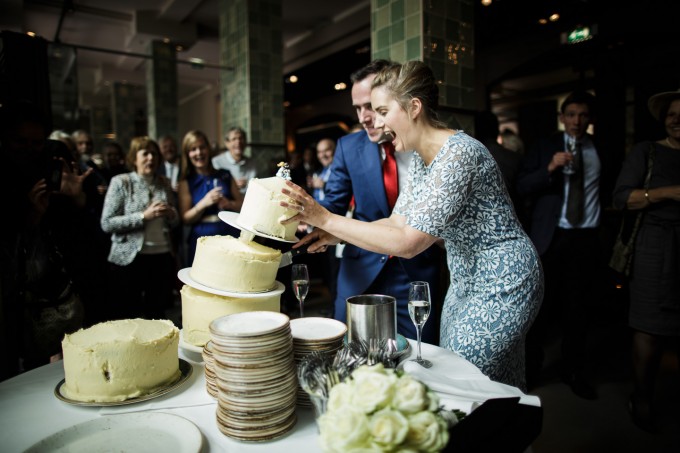
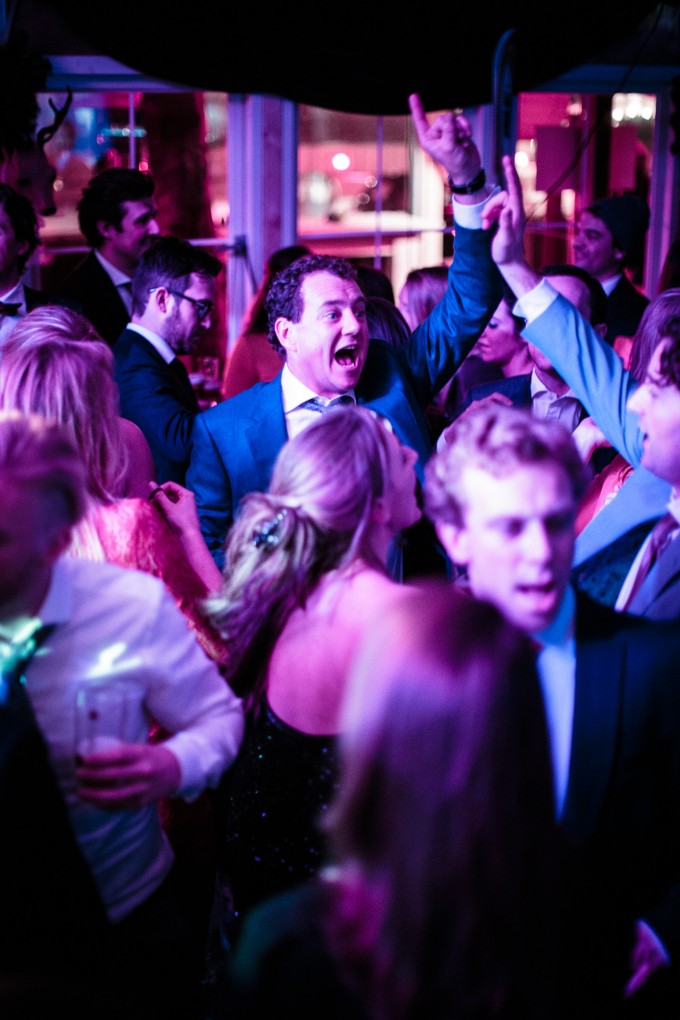

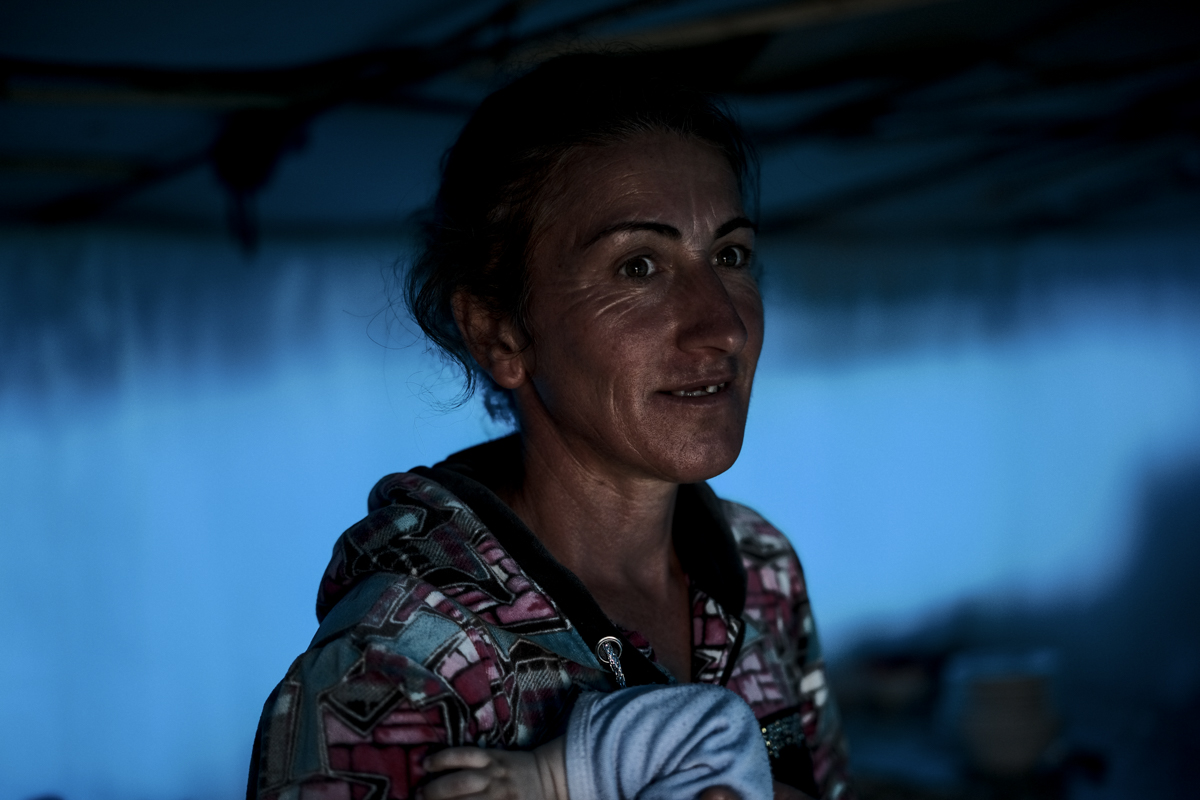
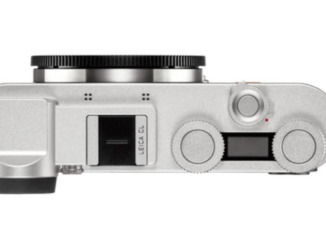

I bought my first entry level DSLR because I wanted to lean more about ‘making’ a photo and not just a P&S for ‘taking’ a photo. Since then, I have become both addicted to the artistic process and the technology of each subsequent camera I have gone on to own. I have taken my DSLR to weddings! I like to use the occasion as a real situation practise and yes even with the desire to make a present to my dear friends! And guess what? I too have had one or two of my captures placed among the happy couples’ favourites! I love seeing the collage of uncle’s, best friends’, phone contributions et al! And never have I heard the elated couple bemoaning the ruined shots of the Pro by their guests. Only laughter and cooing at some of the warm moments captured by all the visionaries and opportunist that celebrated with them…in joy. No one goes hoping to make it a miserable occasion. And photography is a joyous pursuit! You have posted this article on a site where so many come to share their joy in equipment and their pursuit and honing of their artistic expression. Not everyone wants to earn from their passion…but if you are lugging a DSLR to an event trust me that speaks of passion and no the moments are not missed anymore than if one had partaken in idle chatter or being stuck with a venting moaner, or showing one’s latest prowess on the dance floor…live and let live but do no harm. At my camera club, uncles and keen girlfriends of the bride enter such valued photos for critique to improve. Imagine being able to use real family and friends’ events to improve without having to be paid for the privilege to practise? I can only apologize if they get in your way. I’m sure it is just out of friendly enthusiasm and not really a cold warfare. They’d hate to think they had ruined a dear loved one’s day! And surely we are all learning no matter what stage we are on the photographic journey? Attend in love. Share in peace. Enjoy life and make beautiful photographs…all
Dear uncle, I use to not like you, but now, I think of you like a hero that they made you. Keep shooting anywhere with your entry level camera. Don’t mind those poor man/artist with their Leicas stop you. Have fun, you deserve to be happy with your life also.
I agree with much of the article. How tempting it’s become to capture everything, to whip out my iPhone rather than just focusing on the moment at hand unfiltered through a lens.
Interesting article. I respect the author for putting himself out there, likely knowing his strong opinions would result in strong reactions. However, like many here, I cannot agree with all of it. But I’m am not interested in beating a dead horse. It appears that many of the topics I disagreed with have already been mentioned. No need to rehash it. But I would like to make a few brief points.
I choose photography because it is something I have a strong interest in. Is it an art form? In my opinion it is. Does taking pictures automatically make you a photographer or an artist? No. I’ve seen many “popular” users on Instagram with alarmingly poor quality pictures (pictures that are severely over/under exposed, completely out of focus, and have no subject). But for reasons beyond my comprehension they are popular for their photos.
I enjoy photography for a number of reasons. Firstly, it’s journalistic nature. It is all about being in the moment and capturing that exact moment; essentially documentation. Telling a story with a single photo is a wonderful thing and pursuing those stories is why I am always shooting my camera. Secondly, I love the technical aspects of photography. There is a certain amount of physics and math that go into creating a photograph. Combine that with intimate knowledge of your camera and the cold precision of a MF lens and it is pure fun for me. I actually prefer MF lenses. I’ll take a metal Voigtlander over a plastic AF lens any day because that’s what I love. With manual lenses and manual settings there is a certain satisfaction of creating a photo rather than simply capturing it. Personally, it drives me to become better and I love the challenge.
As a side point, I am one of those people who loves wide aperture lenses and I am not at all ashamed to admit it. The assertion that a photographer does not need wide apertures is not necessarily true. The article asserts that wide apertures are only for shallow DOF and bokeh. I use wide apertures for gathering more light. The phrase ” if a pictures wouldn’t be a good one at F5.6, it’s also crap at F0.95″ is complete nonsense when it comes to low light situations. Astrophotography is a basic example. At f/5.6 your image will be far too underexposed if you wish to avoid star trails and use a reasonable ISO. F/1.4 would be a much better choice. Also, there’s a reason why street photographers use lenses that open up to f/1.4 instead of only f/4. Wide apertures are an absolute must for one particular type of photography that I dearly love. Trying to capture crisp images in very low light while both you and you subject is moving is not realistic at f/5.6. I usually need to keep my shutter speed around 1/80 or higher, with ISO not exceeding 3200 (6400 if I push it). With very little available light I need the widest aperture I can realistically use (f/1.4).
Feel free to vent away Arend-Jan, after all, you are the professional being paid to take pictures and probably the best in your village I am guessing. The nerve of those imbeciles jumping in front of you as if they do not even know you are there or how good you are at taking pictures. They are merely pretenders and a nuisance to great photographers. They should be in some empty parking lot, with their entry-level DSLRs and power zooms, practising and honing their skills in hopes of creating something as beautiful as you do some day. I am sure those out of focus photos had to be the fault of the wannabe picture takers getting in your way and all but no worry I can still see what a great photographer you are. And that girlfriend, quick-drawing her iphone just to create something that will soon be without substance. Doesn’t she even understand that only paid photographers can create everlasting emotions. These people are not artists like yourself, they should be dancing or playing golf. Don’t they realize the high price they are paying taking free pictures. Why do they even take pictures, they are not paid. Non professional people need to stop taking so many pictures and ruining extraordinary moments.
After much reflection on your article it is very apparent from your writing that you are very gifted and know what you are talking about. Your insights on picture composition are utterly superb and extremely informative for both novice and expert alike. Someday, I am sure, you will be one of those great entertainers and the world as well as other photographers will be your audience. Thanks for taking the time to share this great teaching essay and your deep thoughts. Hopefully more non professionals will also reflect on it and leave their entry-level cameras at home and just concentrate on dancing and drinking and whatnot. NO MORE COLD WARS AT WEDDINGS PEOPLE.
I photograph for three reasons:
1) I take my Ricoh GR with me everywhere and taking pictures keeps me as it were “in the moment” – really LOOKING at what’s around me instead of just going head down from place to place. I can go to the same food store once a day and see something different each time, depending on who else is on the street, the light that time of day, the seasons changing. Trying to capture that with a camera is a constant challenge and brings joy to my life.
2) For my own creative growth and enjoyment. There is no intrinsic need to share one’s photos. Look at Vivian Maier (cliche answer, I know). If you choose to equate your self worth with how many likes or views your photo has, than don’t bitch when someone with HDR sunsets gets more. Welcome to the world. Look a the most popular movies, TV shows, etc. “Fifty Shades Of Gray” sells more copies than (pick your favorite legitimate author). That is the world we live in. If you can find YOUR audience, the people who get YOU, then feel lucky and happy. I wasted far too much of my life being bitter at the success of others. Use that energy in a more positive direction. And I am the least touchy feely person you will meet. Really.
3) Because if I don’t take pictures of my son my wife will yell at me.
best,
Denis
Well, I see that there are plenty of comments expressing what I was tempted to say after just reading this. I think the article should have been titled “Why you don’t want to take pictures”. I suppose there’s something to it. How much simpler life would be if I didn’t cook, but patronized chefs for every meal; if I didn’t drive to work, but paid a professional driver instead. I could have saved money on the tools in my basement that I use to build mediocre stuff that the world doesn’t need, and only buy things made by craftsmen. I could stop skiing, because I’m really not very good at that. Basically, I could spend all my time working, because that’s the thing that I’m really good at. And I’d need to in order to afford all the people to do everything else that I do in my spare time. Sounds fun.
An article that is simultaneously stimulating, thought provoking, infuriating and obnoxious all in one. So well done on that count for being all things to all men.
I was really turned off by the comments about uncles and friends intruding on the work of ‘The Pro’. It comes across as terribly dismissive on anyone who deigns to pick up a camera that isn’t worthy of being called an artist. I would never, ever consider myself an artist but I enjoy taking photographs. And occasionally I’m happy with them and maybe even one day I’ll submit a few on here for immolation.
But there was also much in the article I agreed with… camera phones are so ubiquitous that we seem to have almost lost the ability to enjoy the moment any more. Everything has to be recorded and shared without any thought as to actually what is going on or feeling the moment. i see this most often at gigs where hordes of fans spent the entire gig watching it through the back of a phone, creating footage that will probably ever even be looked at.
And on the subject of filters and effects… they have their place and for people that like them… what’s wrong with that?
But they should not (IMO) be confused with creativity in it’s purest sense. Having said that they can be used to enhance an existing image, which is no different to the fact that the likes of Adams and others spent many hours processing their images to their liking in the darkroom. Let’s not forget that many so-called iconic images would have been nothing without the skills of a professional darkroom technician.
I loved the OPs first post about their wedding business and thought they showed (IMO) a superb approach to wedding photography.
Its great that we can have such discourse. Life would be so much more boring otherwise.
I was being facetious…as,obviously, the reactions I was commenting on are far from ‘critical’. They are childish.
Your photos seem very meh. Just another neighborhood wedding photographer upset that someone went with another photographer because it was $200 cheaper. Nothing we haven’t seen an amateur do on this site 100 times. A true hard working professional does not complain about others, he finds a way to overcome small obstacles. Just my humble opinion.
Referring to someone’s photographic efforts as ‘very meh’ is hardly a ‘humble opinion’.
To me, Photography is all about ME. MY vision, MY eyes, MY photographs, MY style, MY likes, and any viewers enjoying it or loathing it all is just by the by.
Ibraar, you’re a solipsist.
Is it solipsistic in here, or is it just me?
No Jan, it’s just me!
PICTURE 4 IS A MASTERPIECE ! THANK YOU FOR THAT …
I’m actually new in photography and I’m wondering and confused why you liked this image. Can you pls. explain why? Well, you can either answer or not, but it would be helpful for me to know what others see in a picture. Thanks. Keep shooting!
I can well understand your feelings. You feel that the art of photography – your art of photography in particular – is being drowned out by the oceans of selfies and pictures of plates of food that pervade the world of the web. How can your art rise above and be seen over the billions of images of banality uploaded each day.
This is the price of the democratisation of photography, with free-to-use digital cameras of all sorts and no-cost (except for the dreaded ads) on-line repositories. We are all artists now and it need not cost us anything.
Before the arrival of the digital revolution, us old school photographers were only able to bore small groups of people with our slide collections. Now everyone can bore everyone else with their ‘art’. Or, more likely, their pictures from the concert/museum/show that they actually didn’t get to see because they were too busy faffing around with their iphone/digicam to watch it first hand.
An artist, of what ever medium, should always work from the perspective that they produce their art first and foremost for his or herself. It matters not what others think about their work, after all, its supposed to be them expressing themselves creatively, is it not? The modern obsession of “sharing” everything with everybody has turned photography in particular into a narcissistic obsession. Hello, look at my pictures, over here, at this Flickr/Twitter/500px et al gallery.
So I say quit with the existential angst, and just do what you like to do for you, and only you.
Your reaction can easily make me double down on what Arend-Jan is complaining about (in some of his many comments). Surely we’ve all experienced this: Trying to take a photograph these days of almost anything that does not have one or many people in the scene also taking photographs, often selfies–the worst one of all, or just looking at something on smart phones. What’s the point? In the last 5-10 years we have been invaded by the “democratic” revolution in photography that you praise, as do I, after all, I’m in that population. But what kind of world are we living in when you have to go to Venice in January to take photographs of “just” Venice and some of the people who live there–who are not all waving cameras in the sky? The whole world, and one in particular that Arend-Jan works in: weddings. Who can be happy about a world so saturated with people with cameras who are–frankly speaking–not doing what people do or used to do when they didn’t have cameras. Or personal phones–and the noise they create when they yell into those phones in public. But alas, this is just another dramatic impact the 21st century, “so-called” phone has had on civilization. Crime prevention is another one, however. Win some, lose some. But so easy to complain. Try Venice when a 12 story cruise ship has just unloaded it’s payload. All well armed with some kind of camera.
Can I reply to myself? Quit venting! That’s the world we’ve created.
Venting. Passing wind then.
http://nl.urbandictionary.com/define.php?term=Venting
Close enough for me… LoL!
Thanks for the article! I enjoyed reading your perspective. I’ll bookmark this one to read it again later. You have given me some good things to think about.
Can you pls. tell me your nationality?
Another pompous professional photographer who is upset that everyone else, either through technology or otherwise, can challenge their work. There are some truly wonderful professionals about, don’t get me wrong, but to say that everyone else is wasting their time is condescending at best. Let us hope that the real tone of this article has been lost in translation; however I fear that this might not be the case. Probably better not to disparage amateur photographers on an amateur photography website. Nice photographs by the way but nothing we haven’t seen equalled or bettered by readers of this site imho.
Wait a minute. If the shoe fits, then wear it. All of his criticisms are valid in some situations and for some people. He’s simply challenging us to consider them ourselves. For that we should be grateful. I didn’t read it as a blast at amateurs; pro’s can suffer from the same issues when not working. Cartier-Bresson preferred to work as an amateur because of the demands made by clients, but then he was independently wealthy when he started and had access to almost anyone in the world as a result. Why did he take photographs. We can read his own opinions on the subject, but my guess is that he asked this question to himself many times during his life–as should we–and eventually turned back to drawing. We should all ask how some of the issues that Arend-Jan’s described apply to ourselves and then move on. Great, provocative essay in this regard. Sorry it also seemed arrogant at times.
I found this post difficult to fully understand. However it is how the author sees things and opinions should be respected even if not shared. I have no problem taking photos at social events but sometimes it’s best just to participate and enjoy especially at a wedding where a pro has been hired by the couple and you will mostly get photos later on anyway. So I agree with the post here. I think using nice fast glass wide open is great but can be a bit overdone sometimes. So I agree here as well.
(BTW -most people who take shots at weddings do so to send off in social media -a pro with wifi on his camera could update the couples social media and send off some images of the day on the day with the prior permission of the couple ? Sony A7 can do this I think ) !
The problem with photography is that you can practice it badly all your life and yet still enjoy it. You would probably not sing out of tune all your life or play a musical instrument or paint really badly all your life ? You might well say to yourself “I will explore other creative avenues”.
What people need to understand is that present day super cameras kind of obliges us to produce better work than previous generations if we wish to be considered competent or even artistic. Does this apply all the time- seldom in my opinion.
I think there are really wonderful Wedding photography pros on the scene -all with different styles yet some are really boring and formulaic to me?
We all need humility to understand each others perspectives and after all is said and done -if you enjoy your photography and are having fun trying to improve and realise you are no threat to Ansel Adams or David Bailey then please continue…..
Rgds
For me, I want to interpret your blog entry as why do people like taking pictures. I like taking pictures. If someone asked me why, I would wonder if they also asked people why they like to eat, why they like to drink, why they like to play, etc. It needs no other explanation beyond the fact that people enjoy taking pictures because it makes them feel good.
I would go out on a limb and say more people hire good photographers to document their weddings, so that they can turn around and post these images on social media. You might have taken the picture, but people share their wedding pictures because they feel good when someone ‘likes’ their photo.
Don’t think about this too hard. You really do just come off as annoyed with people poaching in on your decisive moment, when really everyone is taking a photo because it makes them feel good.
You make a good point here, people can and do have great reasons for taking photographs. What Arend-Jan seems to be asking us is to take a moment to self-reflect and ask ourselves why we are doing it. We all have different reasons at different times, not just one. And perhaps not “in general,” but in different situations in your own life where you might have a better experience if you leave your camera at home, or at least in you pocket.
This has to be the most joyless thing I’ve read in a long time. You might need a break from photography before you actually start hating it.
The local paper ran an interview a while back. A successful investment banker had turned his life around after being totally burned out. He was rich by then, and quite young, but he had started hating his life.
So he left banking and started working as an assistant at the local kindergarten. According to his statement, NOTHING in banking could top starting your day off with twenty bear hugs. Every single day.
Sounds like you need a big hug, man.
If i can find anything good in this (far to Long) article then it is that it is provocative and thinking about the reason why one would make photos may make that Person a better photographer. Then again there are so many things wrong in this article, that i dont know where to even begin. is it really only money you take pictures ? i hope not. you could as well ask why people like to watch sports. i dont like your attitude.
Very Dutch: condescending, patronizing, asking questions more than providing answers without any sense of direction, although here and there that pointing finger showd itself.
But maybe a lot was “lost in translation”; the OP is not a native English speaker, so we should view his contribution with compassionate eyes. I mean, what does “I did not intend for this article to be a vent” mean? I know where Mont Ventoux (really hate that climb), but where does it fit in? And the list goes on.
Oh, and there were photographs as well. I wonder who made them, and why. Blast, here I go as well, asking questions without providing answers.
That’s very rude. Is it very American not being able to discern when one says ‘vent’ they mean ‘rant’? The Dutch also say you ‘make’ a photo…you don’t ‘take’ a photo.is that a problem for you?
The ‘finger pointing’ as you put it…is not at YOU…the questions are largely rhetorical.
It is called critical analysis folks, and is a useful tool to become a better artist. If you shirk critical analysis of your own work you will not develop how to ‘see’ better…and therefore not become a more successful artist. I am shocked at the backlash against an article that is so useful to to amateur photographers…making them think rather than offering some technical / material info.
Exactly what this site can use more of.
If you don’t agree with him…well that’s not the point…is is not in any way condescending,pseudo intellectual or trivial. That some here don’t seem to ‘get’ where he is coming from should be no reflection on the OP’s character…and especially about his nationality.
Lance (Armstrong?), I’m Dutch, and I’m a self-appointed expert on condescending and patronizing (and on tongue-in-cheek; a concept very foreign to many Americans).
I actually meant what I said; there’s too much patronizing to my liking in this post, and I don’t think my comments were rude at all.
But you have to forgive my feeble grasp of your language; I’m not a native speaker.
Game, set and match, Michiel. He he.
I am also Dutch….and ther is nothing in what you say about ‘very Dutch’ except some ignorant stereotype. So ya…it’s rude and unacceptable. You are obviously not Dutch…as there isn’t really anything ‘lost in translation ‘.
Actually, Lance, Michiel is 100% Dutch, as regular readers of the blog will well know.
It’s poor form and even sillier to try to support your nonsense by asserting he’s not.
Michiel writes in a most competent manner in English and if I was literate in Dutch no doubt even more so in that language.
Thank you James, that’s very kind.
Lol…well that isn’t the point is it?He may be Dutch…but he can speak for himself that he is condescending and patronizing…as it is most certainly not a ‘dutch’ thing.
As for the aspersions that there is something ‘lost in translation’….well there isn’t .
You will have to explain how I am in poor form and how my reaction to it is ‘nonsense’?
Is is American to be so ignorant not to understand my point?
Whereof one cannot speak, thereof one must be silent.
American? I’m (South) Australian. Through and through. Educated first in Australia and then in a well known university near the Fen Country. Now you can tell everyone what’s wrong with Americans and Australians! Oh dear, this is so amusing.
And a great pleasure, Michiel.
“American? I’m (South) Australian. Through and through. Educated first in Australia and then in a well known university near the Fen Country. Now you can tell everyone what’s wrong with Americans and Australians! Oh dear, this is so amusing.
And a great pleasure, Michiel.”
..and yet you failed to grasp I was speaking rhetorically, and using irony. Yes…well done Michiel…seems they are all good with your pigheaded stereotypes. Bravo.lol
People, please stop jumping in front of the author’s compositions, otherwise we will have more bitter articles like this one here.
I am a computer professional (network security). Does it makes me eligible to complain about a whole nation of young hackers making their way into my knowledge domain just because they are not being paid to do so? Besides their curiosity, all they need is a computer with an internet connection. A camera and a piece of light rings a bell?
For me, photography is storytelling. I don’t look for the ‘wow’ now, but I am sure there will be tons of it when checking the pics (years) later on. The techie thing, gear, post, etc is the icing on the cake. Don’t get stuck.
There is a say in Brazil: dance in accordance to the music. Dance to the tune? Go with the flow? Make the difference in case everyone is catching up quickly. Focus on being creative, on innovation.
Please write about your challenges as being a pro in a wedding full of iPhone flashes, but make fun of it. Leave your rant aside, inspire us (readers).
+!..:):)
Okay, point well made. But tell me how you can dance, go with the flow, be creative (hence, spontaneous), and innovative, not to mention having fun, if all you do at a wedding is run around taking photos with your iPhone. This is not to say you shouldn’t take any photos, but point that Arend-Jan is trying to make is that you sometimes need to experience the moment and not interrupt it by looking at the back of a camera or through a view finder. Who could disagree with that advice?
I often see young people taking images of themselves/ their friends-then looking at them together and laughing loud.
I often see people telling a friend about an event and showing some images on their phone.
so why not.
I agree though that some are little extreme. Watching a concert through the iphone while being there just to capture every second is stupid IMO. However catching some moments…why not?
The M9 is one of the few cameras I can ALWAYS identify from it’s photos. It’s magical rendering is unprecedented IMO. Gorgeous…
Oh, you research first before you comment!
Absolutely. I have the evidence. Leica M9 images can be magical and I have “supplementary” wedding photos to prove it. Okay, one in particular. But it’s the bride’s favorite because it looks different, and yes, gorgeous, if you will. And one that the professional at the wedding could not take with his equipment and did not need to. He had many different types of images to capture well. I was only trying to get one or at most three. I got one. That’s all I wanted out of the experience.
It looks that title of “Rant of working photographer” would be more suitable for this article. While I understand some facts mentioned in article. For example people taking pictures during wedding and ruining shots, that’s why I never take camera to wedding if not asked by married couple. But on the other hand bashing retro styling and blurring of background looks more like hypocrisy when looking at shots provided in article. Almost all of them have subject separation to drive viewer through image and some of them have more film looking colors (unless they were shot at film) and strong vignetting.
Why are we writing? 🙂
Wonderful article, what are you all talking about?
I’m cured, I see the light, hallelujah brother.
Now that I realize I’ve been wasting my time and money all these years and what I should have done is hired a pro on those occasions that I needed to fulfill my artistic urge.
It’s brilliant, it’s like ride share, but for photography.
OpEx vs. CapEx.
I don’t need to buy another bit of equipment, I’ll just hire a pro like you and let you eat the cost.
I can then turn my artistic talent to directing 🙂
Wait, lets not stop there, let’s go to video too.
Why hasn’t anyone thought of this before.
It’s genius.
Thank you brother, thank you!
hallelujah!
Why Do I take pictures?…..Because I want to.
I agree with your first 2 paragraphs. If someone hires a professional photographer, guests should respect that and try to stay out of the way. If the pro can’t do his job properly, it is the client (i.e. the guests’ friends or family) who suffers.
But the rest of the article sounds terribly condescending. Digital cameras and low-priced DSLRs haven’t cheapened photography. It was the Kodak Brownie that made photography available to the masses. And it was the Olympus Trip 35 that made it easy for non-hobbyists to effortlessly capture photos on the go. Everyday people want to take capture memories as they happen. It doesn’t ruin the moment; rather, it preserves it.
When I look back at my small handful of photos from when I was younger, I always wish that I had owned a better camera and had taken more pictures back then. My childhood pictures were taken with cheap cameras on consumer film. My college photos were all shot with disposable cameras. When I worked in Prague 5 years ago, I only owned a cheap Sony P+S that looked terrible at ISO 400. It nearly breaks my heart that I don’t have any usable night shots of that incredible city.
These days, I think to myself, “Thank god I finally have a nice camera (X100S) to document my memories!”
Photoshop and post production filters HAVE definitely cheapened photography. You only need to spend 5 minutes on Instagram or Flickr to see that.
Previously when the ‘masses’ shot on film, there was an honesty in the image. This has now mostly been lost in people’s attempts to ‘enhance’ their images, be it through forced manipulation or filters, and don’t get me started on the horrors of of bad HDR!
Digital imaging software has enabled this, whilst digital cameras have facilitated the creation of editable files. So in some respects, the author does have a point, though I totally agree with you about the tone of the post being somewhat condescending.
And I totally concur with your last comment! 😉
Dear Jh,
Thank you for your post. I totally agree.
Today, everything is set to be “under control”. Arts (whatever they are) or “Creation” (whatever it is), are almost the lonely remaining lands of freedom for anybody wishing to express their feeling.
For instance, please have a look to the Wiki about Ferdinand Cheval, who was a French postman and created his “Ideal Palace” during 33 years. He was first considered has a dullard. Today, people go to visit his construction… http://en.wikipedia.org/wiki/Ferdinand_Cheval
Photography can be a simple media and an Art.
So there are professional making their living from photo, simple hobbyists, and artists.
Plenty of room there for everybody, with a lot of respect and kindness…
Cheers,
Claude
Images are interesting but the article….not so much!!!
We all have our opinions on this article and that is cool. I’m not going to bash the author because afterall he was nice enough to put his thoughts out there and that is cool in its own right even if you don’t agree with what he has to say. So i give him props for putting it out there. Glad i wasn’t the only one that maybe didn’t understand everything in the article, then again i may be a bit slow.
Like the post above says, everyone is an artist when they create something. How good their art is is always up for debate no matter who it is. Not everyone can paint like rembrandt, take photos like ansel or henri, or sculpt like michael, but everyone who tries and puts forth effort is an artist though maybe not as good, and that is ok for they are helping the arts in their own way and that should always be in the back of your mind.
Dear Arend-Jan,
As a real “amateur” photographer, which means that I pay to fulfill my passion and doesn’t make any penny with my photos, yes, I am an artist.
Because everybody who has entered the journey of creation (should it be painting, sculpture, music, etc.) is an artist.
As a designer (my profession), I think that photography is totally similar to Design.
It is not just about objects (photos), it is about the way you see, you think and you transmit your knowledge. Yes, I feel this article is totally condescending and tends to show the “so big” difference between amateurs and the fantastic professional you seem to be.
I have met fantastic professional photographers who show a beautiful humility about their job and passion. When they talk about photography, they don’t try to show off and throw simplistic assertions.
They always try to help you to be… just better… I love them!!!
You make a few good points Claude, but you are wrong about anyone who ‘enters the journey of creation is an artist’. If this logic were true, cooking up some instant noodles and adding a bit of garnish would make me a Chef.
Being ‘artistic’ does not equate with being an artist in the true sense of the word.
There’s the problem right there. They’re all calling themselves artists but none of them are producing art.
I take photos simply because I love photography. I will not disagree with what you wrote, but for me, I can’t not take photos. If the proverbial uncle with his bulky DSLR really loves taking photos, then he is not unwise when he sees half the ceremony through the viewfinder. Some people carry such cameras as trophies, not because they really love the art. But even so, we all have our vanities and insecurities, eh? 🙂
Personally, I think that the only people who need a DSLR are sports photographers. Everybody else can save themselves the anxiety of wanting to look ‘serious’ or ‘professional’ and use smaller cameras. I have come to an amazing conclusion: if I’m not being paid to take photos, I much prefer to use the iPhone than a bigger camera. Even since the 4S, the iPhone’s camera has really impressed me.
And I think many, many people ‘get it’ now and are going in that direction. So, what’s the best travel camera, for example? Some might say, oh, the Olympus E-P3 or some such thing. But – who is paying you to take photos? Do you need that level of quality? Yes, you want quality, but some phones have cameras so good now that you might just use that.
“wow, that really happened!”
That is exactly what makes photography unique. Of course, one can manipulate a photo, and that’s okay as long as one simply admits it. My opinion: you might be a skilled compositor, but if the scene you made up in Shake or Photoshop or Pixelmator did not happen, where is its value? Of course commercial photography has special demands and I don’t begrudge it.
And there’s nothing wrong with Noctilux type lenses, either, in skilled hands (if you’ve seen any of Thorsten Overgaard’s photos, you’ll notice that he shoots mostly with the 0.95 Noctilux these days). But many people use those lenses for fashion’s sake, not because they really can make better photos. Some ignorant people think that wide apertures are necessary for the ‘cinematic look,’ forgetting that some of the most visually amazing films were shot with deep focus or with relatively narrow apertures.
And then some people apply weird filters in post-processing. Of course this serves no purpose and does not improve the photo. Some people think that wearing sunglasses indoors is fashionable. But nobody gets hurt, so whatever.
“I like to think that photography is about letting others see whatever it is you have seen and want them to see.”
Agreed. And I’d go further: if I’m lucky, I can show someone what only I saw, and which everybody missed even though they were present. Sometimes I look at my photos and think, “Huh, that turned out much better than I remember!”.
sounds like you understood what i’ve been trying to convey:)
You lost me at ” I have come to an amazing conclusion: if I’m not being paid to take photos, I much prefer to use the iPhone than a bigger camera”
For someone who makes his living, at least in part, by documenting the happiness of other people, I was impressed (negatively so) by the author’s candor in expressing his blatant contempt for anyone who might dare to pick up a camera… except, of course, for he and his brothers, whose talent and artistic vision are evidently umatched in human history.
The author’s astonishing arrogance notwithstanding, I found myself reluctant to criticize the writing on its own merits – or lack thereof – as I infer that English is not his native language. In fact, he’s owed some acknowledgement for the effort; I doubt I’ll ever attempt a post of that length in a foreign language. Nevertheless, it was not an easy thing to read, as there were just so many grammatical errors and SO MANY words used incorrectly. I really wish it had been proofread and properly edited before he submitted it to this site.
Nice photos, by the way.
When my friends get married, i do not take a camera with me. For the sole reason that i can not do both.
Wow…I’m surprised at the negative reaction to this article. I can surmise that the people reacting negatively to this are in fact ..(psst)… Not very good photographers. Here’s why…at a certain point in one own’s artistic development , an artist knows there worth. They know there creative output has reached a certain level of quality, depth and that it is successful. Not necessarily in monetary terms or even juried exhibitions…for the work may not even be shared/ disseminated wildly. Well…I am one of those types, and I agree, in principle , on the validity of some of the observations in this article. Ipso facto…if you have a smug,ignorant and thoughtless comment against this article, my guess is your art is probably rubbish. Please…mr.’s pseudo,condescending and trivial pursuits….link us to some of your own images. I’d bet my last dollar your work is mediocre at best.
“I’d bet my last dollar your work is mediocre at best”.
We’d want to see the colour of your money first, Len, for I have the feeling your judgement would not be..uncoloured.
It’s a cheap and rather silly comment to be hoping that anyone who provides a critical view of the assertions in Mr Westerhuis’s writings must automatically be useless at photography. If it gives you solace, then wallow in your wishes.
I’m not interested in his last dollar, but I’d like to know the number of dollars that precede that last one… Might be of interest.
“Since the dawn of the digital camera it seems everybody deems themselves an artist”. Oh really?
Is there any evidence which does not support this wild hypothesis? Absurd.
“Isn’t it better to make memories before trying to savour them?”.
What evidence do you have which says that this doesn’t happen? What absolute nonsense.
” And by only recognising social highlights as picture worthy, aren’t we cutting short on life itself? “.
Again, what evidence do you have of that? Note the “we”. Have you looked to find evidence which does not support it?
More nonsense.
And so it goes on. The “essay” is built on strawman assertions. There seems to be an attempt to avoid reality and instead suggest most people, sans the author, are engaged in trivial pursuits beyond their simple understanding.
Pretentious sludge. 1/10.
Harsh. But fair.
Condescending? Pseudo intellectual drivel? Please tell why you think so instead of hiding behind smug, thoughtless value judgements. Whether you agree with it or not…the article is in the least a thoughtful attempt to look at things with a different point of view….and reflecting on the nature of photography.
Thanks man!
Take it easy.. hope you are not in such a hurry to make money on your photography that you have forgotten how funny AND exciting it was shooting pictures to start with? I understand that the uncle with the mega DSLR and the girlfriend and her iPhone gets in your way, but hey. Pencils and papers have always been around but not everyone is Leonardo da Vinc or Shakespeare.
Pseudo – intellectual drivel.
I would like to pick up on what you wrote about bokeh. What bokeh is supposed to do, is get the picture rid of untidy background and push motif into the front. So I too wonder why is this the new holy grail in the modern photography for so many people now. Trying to make something that shouldn’t be noticed/noticeable beautiful, round shaped and beautifully defined. I bet most of the people who are not photographers don’t even notice bokeh…
What the term bokeh does, is make a statement about the quality of the out of focus background. More blur does not mean more/better bokeh. f/0.95 does not mean more/better bokeh. You can get better bokeh at f/5.6 than f/1.2. It’s a subjective assessment of the way a lens draws under certain conditions. Isolation with a shallow depth of field and wide aperture may impact upon the quality of the bokeh, but do not give you “more” bokeh.
I’m not sure it’s worth stating this, the term is misused in the article and on this website – it’s a losing battle trying to explain it.
Totally condescending article!
Great read..
Hi there,
I can answer your question: I take pictures because
a) it is fun
b) some are a great memory
c) sometimes I give them too people and they often enjoy a lot to have some good captures of special moments
One comment: your opinion about wedding guests taking images seem a bit “interesting”; why do you assume that those images are bad? I often bring my Leica M with one or 2 fast lenses to weddings of friends, without having pressure to catch each and every moment I still take some images and it happened more than once that these images belonged to the favorite images of the wedding couple.
Pretty sure you could take the couple’s favorite image on a $50 compact.
I dont think so. I like shooting without flash and I dont know a $50 compact which has a fast lens with decent IQ. Of course it wouldnt have to be a Leica but on the other side I like shooting with the Leica and the lenses are good too. If you were trying to say, that the camera brand doesnt matter – I fully agree.
A picture is a moment in time captured on film or now a disc. It is important to the person who took it or for whom it was taken.
Whenever, these kinds of conversations come up, I one time heard and it may not be so, that when asked about the meaning of Moby Dick Melville said: I wrote a book about men and whales.
I hear people say that they went out over the weekend and took 5,000 pictures. I often think that they did not take any pictures but rather shot a movie!